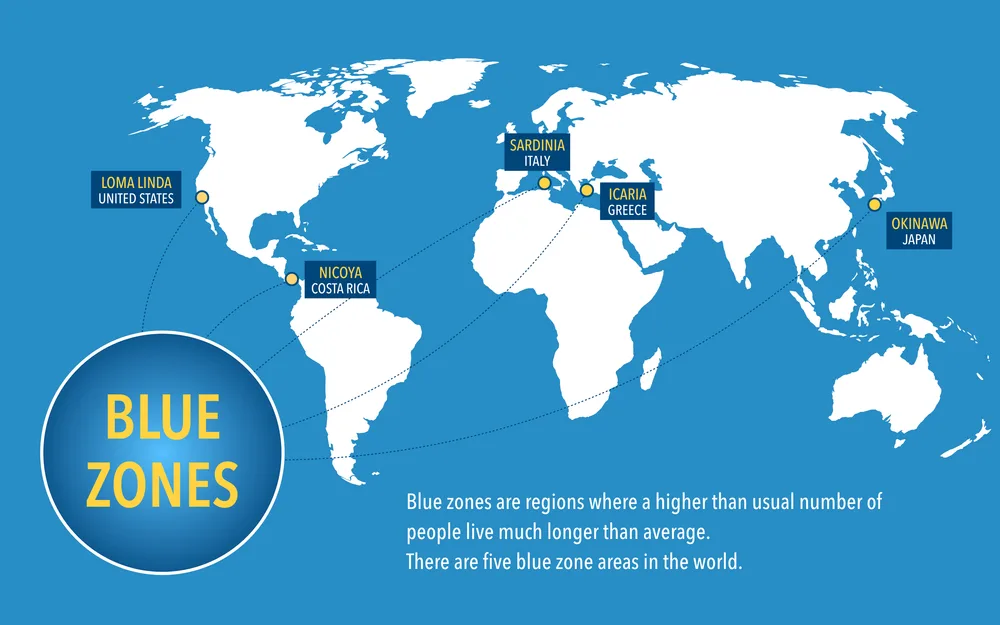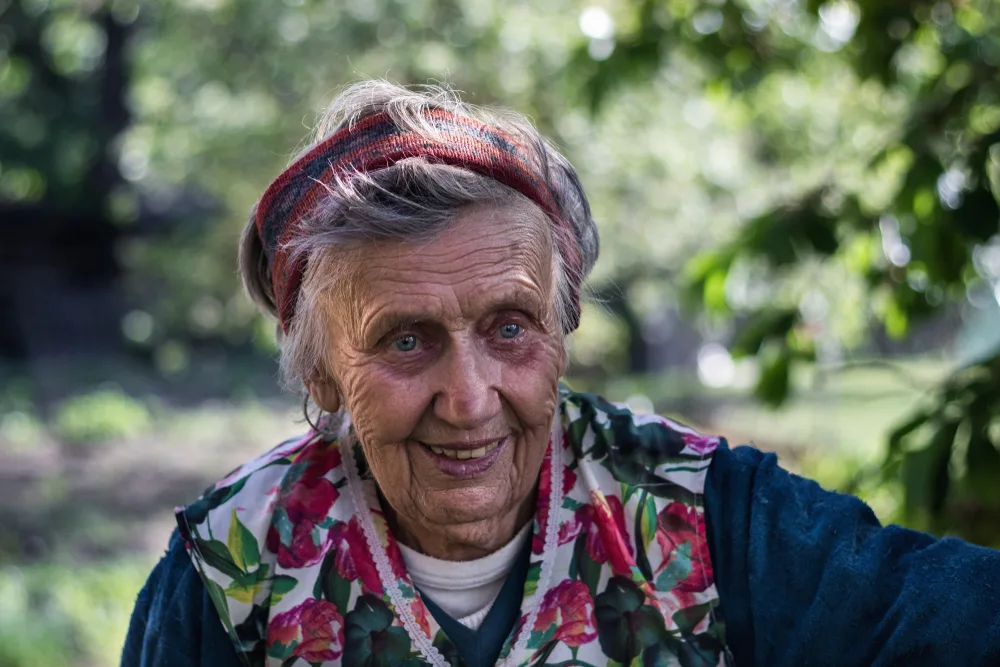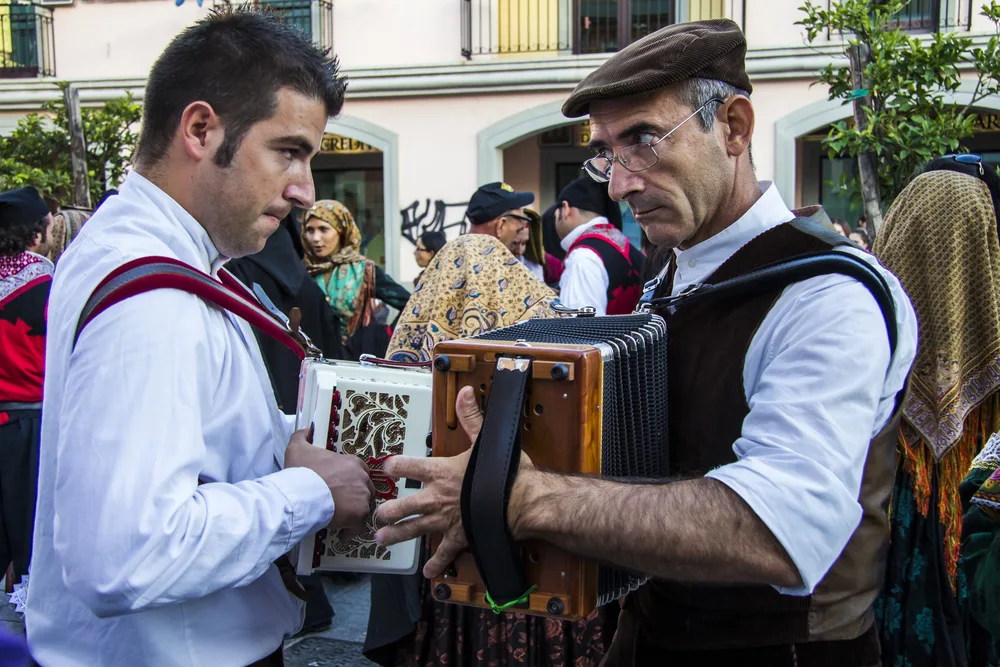Blue Zones: The Areas of The World With The Longest Living People
‘Blue Zone’ is a name that has been coined for the regions in the world where people are healthiest and live the longest. The concept of blue zones grew out of the demographic work done by Gianni Pes and Michel Poulain outlined in the Journal of Experimental Gerontology. Through their research, they found five areas of extreme longevity and began to refer to these areas as ‘Blue Zones’. They are:

- Barbagia region of Sardinia – Mountainous highlands of inner Sardinia with the world’s highest concentration of male centenarians.
- Ikaria, Greece – Aegean Island with one of the world’s lowest rates of middle age mortality and the lowest rates of dementia.
- Nicoya Peninsula, Costa Rica – World’s lowest rates of middle age mortality, second highest concentration of male centenarians.
- Seventh Day Adventists – Highest concentration is around Loma Linda, California. They live 10 years longer than their North American counterparts.
- Okinawa, Japan – Females over 70 are the longest-lived population in the world.
The inhabitants of the blue zones live at opposite ends of the world and come from completely different ethnic backgrounds. Research is finding that genetics only account for about 10% of longevity. It is diet and lifestyle that plays the biggest role in determining your lifespan. So what are the commonalities among these Blue Zones that lead to longer, healthier and happier lives? Dan Buettner, a National Geographic Fellow and multiple New York Times bestselling author, went on a Blue Zone expedition to discover why these societies are living longer than the rest of the world and these are the main parallels he found:

1. Move Naturally
The world’s longest living people don’t exercise purposefully, run marathons or go to the gym. Instead, they move naturally and live in environments where they grow gardens and de-convenience their homes so that they have no other option but to move. A study of men in the Sardinian Blue Zone found that their longer life was associated with raising farm animals, living on steeper slopes in the mountains and walking longer distances to work. While that is most likely not a lifestyle that we live, we can opt to walk or bike instead of drive or mow the grass instead of using a grass cutting robot.
2. Individual Purpose
The Okinawans call it “Ikigai” and the Nicoyans call it “plan de vida;” for both it translates to “why I wake up in the morning.” Who are you? What do you stand for? What are you passionate about? Answering these questions and cultivating a sense of purpose is worth up to seven years of extra life expectancy.
3. Daily Stress Shedding Routines
We all experience stress, even the residents in the Blue Zones. Besides making us feel bad, stress leads to chronic inflammation, associated with every major age-related disease. What the world’s longest-lived people have that most of us don’t are routines to lessen their stress. Okinawans take a few moments each day to remember their ancestors, Adventists pray, Ikarians take a nap and Sardinians do happy hour with local wine (more on that later). Give yourself some time each day to decompress and do whatever it is that you enjoy.
4. Portion Control
There is a 2,500-year old Confucian mantra that the Okinawans say before meals, which reminds them to stop eating when their stomachs are 80 percent full. People in the blue zones stop eating before they are full and they also don’t eat late in the day.
In addition to being mindful of how much they eat, periodic fasting is also part of a few of these cultures. For example, Icarians are typically Greek Orthodox Christians, a religious group that has many periods of fasting for religious holidays throughout the year. One study showed that during these religious holidays, fasting led to lower blood cholesterol, lower body mass index, and reduced blood pressure, which are all risk factors for chronic disease in humans.
5. Most of their nutrition comes from plants.
Chickpeas, black beans, lentils and nuts are the protein cornerstone of most centenarian diets. Meat is eaten on average only five times per month, with serving sizes of about 3-4 oz., an amount that could fit in the palm of your hand. The rest of their plate is full of locally grown vegetables, fruits, legumes, and in Sardinia’s case, goat cheese.
6. Wine at 5pm
Residents of all the blue zones (except Adventists) drink alcohol moderately, regularly and most often with family and friends. Moderate drinkers actually outlive the non-drinkers. The trick is to drink 1-2 glasses per day, (preferably Sardinian Cannonau wine). To learn more about this special wine, click this link. Studies have shown that people who drank a 5-ounce (150-ml) glass of wine every day for six months to two years had significantly lower blood pressure, lower blood sugar, more “good” cholesterol and improved sleep quality.

7. Belonging to a faith based community
All but five of the 263 centenarians that Dan Buettner and his team interviewed belonged to a faith-based community. Denomination doesn’t seem to matter, but all the research shows that attending faith-based services four times a month will add 4-14 years to your life.
8. Put your loved ones first
They put their families first. Unlike in the U.S., where the elderly live separately in retirement or nursing homes, Sardinians don’t dismiss their elders. If anything, they promote them. This means keeping aging parents and grandparents closeby or at home with the family. It lowers disease and mortality rates of children in the home too. They also commit to a life partner (which can add up to 3 years of life expectancy) and invest in their children with time and love.
9. Create a healthy tribe
The world’s longest living people chose, or were born into, social circles that supported healthy behaviors. Okinawans created ”moais”, groups of five friends that committed to each other for life. Research from the Framingham Studies shows that smoking, obesity, happiness, and even loneliness are contagious. So pay attention to who you surround yourself with. These people have a greater effect on your health and happy future than you may realize.
The Blue Zone regions are home to some of the oldest and healthiest people in the world. Although their lifestyles differ slightly, they mostly eat a plant-based diet, exercise regularly, drink moderate amounts of alcohol, get enough sleep and have good spiritual, family and social networks. Buettner added, the average person can increase his or her life expectancy 10-12 years by adapting a Blue Zone lifestyle. As the new year approaches, now is an incredible time to start cultivating some of these healthy lifestyle habits that could add a few amazing years to your life.
If you are interested in learning more, here is a great TedTalk with Dan Buettner about his expeditions to these places and what he learned:
